It’s Thursday, August 2nd, 2012….and here’s The Gouge!
First up, a show of Conservative support even the MSM had to acknowledge:
Chick-fil-A Appreciation Day gets long lines of support


Or, as one sage observer stated:

Here’s the juice: once again, this entire flap has nothing to do with gay “rights” and everything to do about rank political pandering and blatant hypocrisy. It’s about forcing anyone who disapproves of homosexual marriage to actively approve the concept regardless of any religious beliefs to the contrary.
On the same day Rahmbo declared anyone who believes the Biblical definition of marriage persona non grata in the Windy City, who did he welcome with open arms and a hearty handshake?

Just a guy who hates Jews, Whites….oh,….and homosexuals! Perhaps Mayor Emanuel should take a moment and define what his city’s values are. One thing’s for certain; Emanuel doesn’t represent ALL Chicagoans:
Black Pastors: Banning Chick-fil-A From Cities ‘Same Thing’ As Banning Blacks From Restaurants
Next up, courtesy of the WSJ, David Harsanyi offers a little bit of historical perspective on Mitt Romney’s Jerusalem comments you’ll likely not get from the MSM:
….During his recent visit to Israel, Republican presidential candidate Mitt Romney commented that “it is a deeply moving experience to be in Jerusalem, the capital of Israel.” Somehow this declaration of fact has become controversial and a “gaffe.”
Needless to say, the Obama Administration took a shot at Romney’s foreign policy “fumbles.” And in response to the candidate’s innocuous declaration, White House Deputy Press Secretary Josh Earnest stated: “Well, our view is that that’s a different position than this administration holds. It’s the view of this administration that the capital is something that should be determined in final status negotiations between the parties.”
Funny, because when addressing the American Israel Public Affairs Committee on June 4, 2008, as a Democratic presidential hopeful, Barack Obama said that “Jerusalem will remain the capital of Israel, and it must remain undivided.” Like Romney, Obama upset the perpetually upset Palestinian government.
Naturally, Obama immediately backtracked—or perhaps evolved—saying, “Well, obviously, it’s going to be up to the parties to negotiate a range of these issues. And Jerusalem will be part of those negotiations”—which is nearly identical to the position Mitt Romney took this past week on the status of (East) Jerusalem.
The media has also taken up the charge. The Week claimed that “Romney also delivered a policy speech, pointedly calling Jerusalem the capital of Israel (a controversial declaration that U.S. presidents have avoided for decades).” . . .
On the question of Jerusalem, then, Romney joins other noted Likudnick radicals like Bill Clinton, who, during the 1992 campaign, said that he would “recognize Jerusalem as an undivided city, the eternal capital of Israel, and I believe in the principle of moving our embassy to Jerusalem.” And John Kerry, whose campaign material in 2004 stated that he “has long advocated moving the U.S. Embassy to Jerusalem, Israel’s indisputable capital. In 1999, he signed a letter taking President Clinton to task for not moving the embassy.”
Imagine that: a supposedly impartial MSM demonstrating undeniable bias in their reporting; whooda thunk it?!?
Ann Romney slammed for $990 Shirt, Michelle Obama praised for $6,800 jacket

And lest anyone forget, Ann Romney doesn’t buy her clothes on the taxpayer dime in the midst of the worst economy in most Americans living memory while railing against the “rich”.
Which provides the perfect lead-in for Jonah Goldberg’s latest, as he asks….
What’s Behind Hatred of Obama?
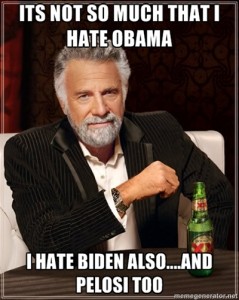
What drives Barack Obama’s “doubters and haters”? So asks Obama biographer David Maraniss in a recent op-ed article for the Washington Post. By doubters and haters he means the people who think Obama wasn’t born in the U.S., that he’s a secret Muslim or that he’s a closet socialist.
He has an answer: “Some of it can be attributed to the give-and-take of today’s harsh ideological divide. Some of it can be explained by the way misinformation spreads virally to millions of like-minded people, reinforcing preconceptions. And some of it, I believe, arises out of fears of demographic changes in this country, and out of racism.”
True enough! Some people are no doubt driven by such motivations and anxieties; “some” is a gloriously accommodating word.
But that hardly settles things. For an essay titled “What Drives the Obama Doubters and Haters,” Maraniss offers no explanation until the last paragraph (the quote above). And even then he offers no evidence, just assertions.
I think Maraniss is a great reporter, and I don’t believe for a moment he is in on a cover-up of Obama’s “real” place of birth or his secret Muslim faith. (Nor do I think either allegation is true.) As to Obama’s closet socialism, I’ve never found it unreasonable (never mind racist or paranoid) to think Obama’s more comfortable with European-style social democracy (aka socialism).
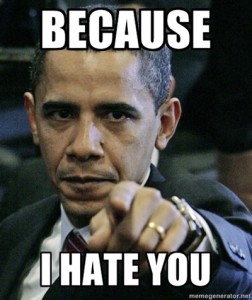
Still, let me add two culprits to Maraniss’ list: The first is Barack Obama. The second is the journalistic establishment that worked so hard to get him elected.
As Maraniss demonstrates quite effectively in his book, “Barack Obama: The Story,” Obama’s identity has long been a cultivated political project. Much of the poetic license — to use a kind phrase — Obama deploys to tell his own story is plausible only to those eager to take him at his word. Maraniss couldn’t authenticate Obama’s tales of racial hardship as a young man. His grandfather being tortured by the British, the bigotry of his high school basketball coach? Untrue.
Moreover, Obama’s explanations about the aspects of his past that have managed to become controversies have always seemed insufficient to people not disposed to root for him. Bill Ayers — a former domestic terrorist — was “just a guy living in my neighborhood.” Obama’s word that he wasn’t a member of the radical New Party was enough for the press corps to stop digging for evidence that he was (as reported by my National Review Online colleague Stanley Kurtz). Jeremiah Wright? Only right-wing crazies care about him.
Even Obama’s more recent embellishments about, for instance, being outspent and outgunned in his previous political races strike many people as the sorts of fibs that would create journalistic frenzies if uttered by a Republican.
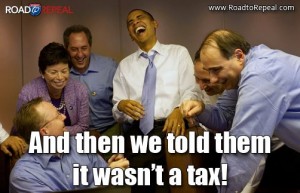
And then there’s the huge divergence between the president Obama said he would be and the president he’s actually been. In 2008, Obama insisted that he was a unifier, a pragmatist and a non-ideologue. You don’t have to be a birther or a secret-Muslim conspiracy theorist to feel like that was all a big con job. That’s politics and not deceit (a subtle distinction!), but dismay at how Obama has governed doesn’t amount to racial panic either. And blame for the widespread feeling that we were sold a bill of goods by a cheering press does, in fact, belong to the press.
Yes, Obama also signaled to his base that he intended to be a “transformative” president, a progressive Ronald Reagan. But that message was intended only for his base. Whenever conservatives picked up on those notes — when he said he wanted to “spread the wealth around,” etc. — the immediate response from the Sunday talk show crowd was that conservatives were being paranoid for misreading Obama, the pragmatist.
It’s fine to beat up on conspiracy theorists, but journalistic muckety-mucks who are mystified by their ever-shrinking credibility — and profitability — might wonder what they’ve done to fuel a climate of distrust. There’s a reason why ABC’s Jake Tapper is one of the few nonconservative reporters respected on the right: He’s stayed as skeptical of Obama as he was of George W. Bush.
Meanwhile, it’s fascinating how much attention the conspiracy theorists get. It’s almost as if some journalists want to use them as bogeymen to discredit all criticism of Obama. That’s some journalists, not all.
Or, in the interest of accuracy, nearly all. Goldberg’s observations are correct, as far as they go; but in our humble opinion, he misses the real source of the visceral dislike Obama generates.
While much of the animus is in reaction to his Socialist policies, we’d posit more is simply a reflection of utter scorn, disdain and contempt the man and his entire Administration demonstrates towards America, her most cherished institutions and a significant portion of her population. That most if not all of the people in question have never worked a hard day in their lives, nor achieved anything of note only amplifies antipathy.
We literally cannot even listen to the man, yet we don’t hate him per se; but we certainly abhor everything and anything for which he stands. Then again, what’s to like about a guy who wants to subject my kids to perpetual government servitude to ensure his own personal power and financial gain?
In a related item, Michael Barone suggests the supposed death of bipartisanship may have been exactly what some doctors ordered:
Partisan divide: Eggheads get what they wished for

The only tangible result of bipartisanship we know.
“Answered prayers,” Saint Teresa of Avila is supposed to have said, “cause more tears than those that go unanswered.” Especially, I fear, the answered prayers of political scientists.
These days you hear academics and pundits bemoaning hyperpartisanship of our politics. It has never been worse, some say. This shows a certain ignorance about history. Go back and read the things that John Adams’s and Thomas Jefferson’s partisans were saying about each other in 1800. Or reflect on the fact that Aaron Burr, Jefferson’s first vice president, and Andrew Jackson, the first president to call himself a Democrat, both killed men in duels.
And when you go back in history, searching for that golden moment when politicians of both parties spoke warmly of each other, you only find some glimmers here and there.
Some eminent political scientists today argue that we would have less virulent partisanship if we entrusted the drawing of congressional and legislative districts to non-partisan commissions. Maybe that would have some marginal effect. But in California and Arizona, which recently set up such panels, Democrats have cleverly gamed the system to get favorable district lines. Republicans will presumably try to do the same next time. In any case, there will still be many one-party districts.
I ascribe much of the partisan tone of today’s politics to two changes urged by the political scientists I studied in college nearly half a century ago. One was the idea that we should have one clearly liberal and one clearly conservative party. This was a popular enough argument in the 1940s and 1950s that Gallup used to test it in polls.
Political scientists and sympathetic journalists were annoyed that there were lots of Southern (and some non-Southern) conservatives in the Democratic party and that there were a fair number of pretty liberal Republicans in big states like New York and California. Wouldn’t it make more sense, they asked, to have all the liberals in one party and all the conservatives in the other? That way, they said, voters would have a clear choice and the winning party (the liberals, most of them hoped) would be able to enact its programs into law.
There are indeed rational arguments for this. For years Southern whites clung to the Democratic label because of memories of the Civil War, while many liberal Northerners supported Republicans because they disliked big city Democratic political machines. Neither party was ideologically coherent.
Today it’s clear that the prayers of the midcentury reformers have been answered. The Republican party is a clearly and nearly unanimously conservative party, while the Democratic party is the natural home for liberals. As a result there are more party-line votes in Congress than there were half a century ago. There are fewer friendships and alliances across party lines. Parties with super-majorities can enact their programs (e.g., Obamacare) even in the face of hostile public opinion.
Another idea peddled by political scientists and some thoughtful liberal politicians half a century ago was that there should be more party discipline in Congress. Rep. Richard Bolling, frustrated that Democratic House speakers didn’t force Southern conservatives to vote the liberal line, wrote two books in the 1960s advocating this. Liberal political scientists and columnists liked the idea.
So when Democrats won big majorities in the Watergate year of 1974, San Francisco Rep. Phillip Burton, in a typical backroom maneuver, engineered the election of Democratic committee chairmen and important subcommittee chairmen by secret ballot. House Republicans adopted a similar rule, providing for election by an elected steering committee, after their big win in 1994.
There’s a certain logic to this, and I believe the results on balance have been positive. You don’t see senile chairmen frozen in office by the seniority system (a progressive reform in 1911) any more, and both parties have generally chosen competent chairmen. But — and here’s the answered prayers department — you also get more partisan politics. Anyone wanting a chairmanship some day had better not dissent from party orthodoxy very often.
A reputation for bipartisanship doesn’t help you get ahead when members of the other party don’t get a vote.
The fact is that in a free electoral system politics will always be adversarial. And in a two-party system it will often be bitterly partisan in tone. You can pray that things will be different. But you may not like how your prayers are answered.
Most importantly, given our current circumstances, bipartisanship won’t stop a country heading for insolvency at breakneck speed; it will only serve to slow the speed of approach and delay the inevitable.
Moving on, John Stossel examines several of the Liberal….
Myths We Live By

The Olympics have gone smoothly despite — gasp! — America’s team wearing clothing made in China at the opening ceremony.
“I’m so upset,” said Senate Majority Leader Harry Reid. “Take all the uniforms, put them in a big pile, and burn them. … We have people in the textile industry who are desperate for jobs.”
Here, Reid demonstrates economic cluelessness. It seems logical that Americans lose if American clothing is made overseas. But that’s nonsense. First, it’s no surprise the uniforms were made in China. Most clothing is. That’s fine. It saves money. We invest the savings in other things, like the machines that Chinese factories buy and the trucks that ship the Olympic uniforms.
The Cato Institute’s Daniel Ikenson’s adds: “We design clothing here. We brand clothing here. We market and retail clothing. … Chinese athletes arrived in London by U.S.-made aircraft, trained on U.S.-designed and -engineered equipment, wear U.S.-designed and -engineered footwear, having perfected their skills using U.S.-created technology.” That’s free trade. Trade makes us richer.
While making the clothes in America would employ some Americans, the excess cost would mean that the Olympic committee had less to spend on other products — many of which are made in America.
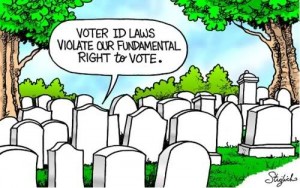
Losing jobs like cutting, sewing and working on a loom is a sign of progress because working in factories is unpleasant. It’s good for most Americans when factory jobs are replaced by engineering and design jobs. Art Carden, an economist from Sanford University’s Brook School of Business, explained that “one could argue that the American uniforms were not manufactured in China, but grown in the soybean field in Iowa. We export soybeans to China. Because we’re incredibly productive in the soybean market, we get more uniforms at lower prices (and) the Chinese get more soybeans at lower prices. … Everybody wins.”
Contrary to protectionists like Sen. Reid, if we insisted that everything be made in America, we’d be poor.
There is so much that we think we know — that is not so.
We’re told that “overpopulation” is why countries are poor. But that’s nonsense, too. “The problem is not that there are too many people,” Carden said. “The problem is that for the most part they don’t have free markets.”
Right. They have bad governments, kleptocracies that steal people’s resources. The data make that obvious. Poverty in Nigeria and Pakistan is often blamed on “overpopulation.” Nigeria has 174 people per square mile! Pakistan 225! But so what? Wealthy Holland has 483 people per square mile. Hong Kong, 6,783. Singapore, 7,252. These are among the richest places in the world. They also have clean environments. When there is the rule of law and economic freedom, more people means more inventions, the cross-pollination of ideas — and that creates better lives.

Another myth is that we’re running out of fuel. In 1977, President Jimmy Carter said gas and oil would be gone in the next decade. Others said by 2000 or 2010. It didn’t happen because as oil and gas get expensive, people search for substitutes. When they are free to profit by doing that, they invent new ways to dig deeper, suck more oil out of the same wells, etc. America now has stores of much more oil and gas than when Carter was president.
There are so many myths. I wrote my new book when I realized that the most dangerous myth is that solutions to our problems will most likely come from government. It’s intuitive to think that the wise people in Washington know more than we do. Therefore, they should plan our lives. But the opposite is true.
People freed to pursue their own interests are more likely to solve problems. Government fails, but individuals succeed. Individuals would create prosperity if politicians and bureaucrats got out of the way. It is time we saw through the big government scam.
Myths? These sound more like lies….and deliberate lies at that.
On the Lighter Side….
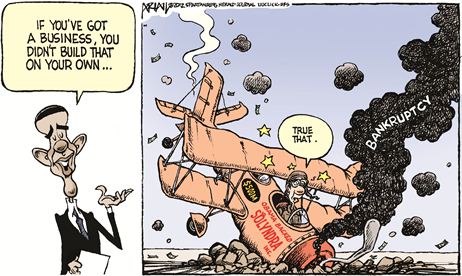
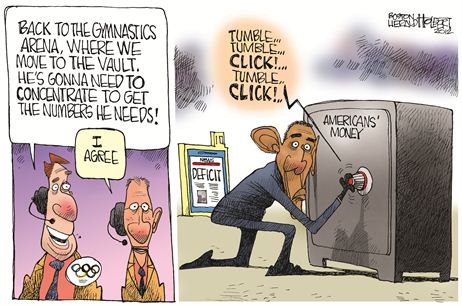
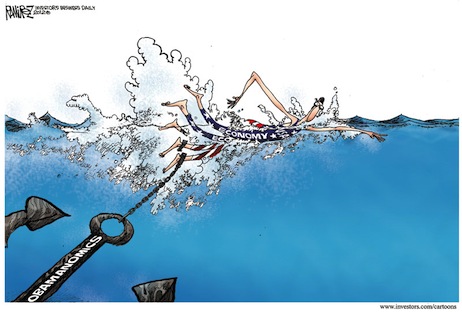
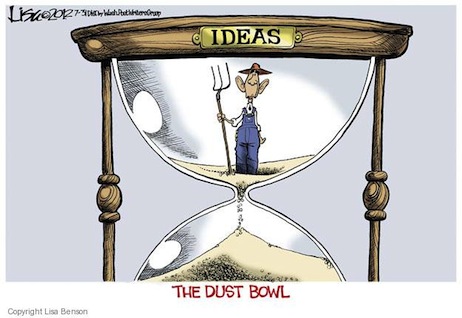
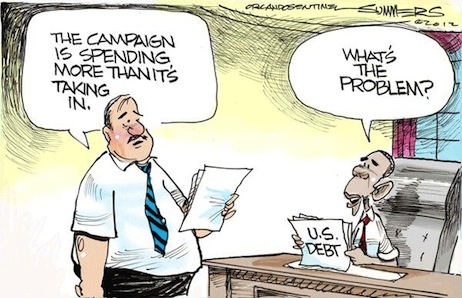



Then there’s this gem forwarded by Shannon Wood, and a true Georgia patriot:

And in another sordid story ripped from the pages of the Crime Blotter, is it any wonder little Johnny can’t read?
Former St. Louis teacher charged with rape, thought statute of limitations expired

A retired teacher who told police he sexually assaulted two former students decades ago thought the statute of limitations had run out, but found out he was wrong — and found himself behind bars. Donald Ingerson, 67, who taught in the St. Louis area from the 1960s through the 1990s before moving to Minnesota, first called St. Louis police in early June to tell them he had raped two girls — one in the 1970s and the other in the 1990s, authorities said. He met with them on Monday and spelled out his crimes, according to authorities.
“This is the first time we’ve had someone contact our office and say, `I want to talk about what I did,’ ” St. Louis County prosecutor Bob McCulloch told reporters during a news conference.
Ingerson, who has been charged with rape and statutory sodomy, remains jailed on $300,000 cash bond after being arrested and charged Monday. He doesn’t have an attorney, and McCulloch said the suspect seemed surprised to learn the statute of limitations had not expired in at least one of the cases. McCulloch also told reporters that he believes there could be other victims.
McCulloch said the first charge stems from an assault on a 16-year-old girl from around 1974 to 1976. The second involved a 15-year-old girl in 1995. McCulloch said the statute of limitations is 30 years, adding that that clock begins only after a minor becomes an adult. The statute of limitations for rape and sodomy varies because laws have changed over the years, he said.
Both victims have been informed of the arrest and are “quite relieved,” McCulloch said. “Even after all this time, they seemed quite relieved,” he said.
We’re frankly surprised neither the NEA nor the AFT has yet jumped to McCulloch’s defense….as they have numerous other times for teachers every bit as guilty as he. It’s just one more way teachers unions are all about the children!
Magoo























You must be logged in to post a comment.